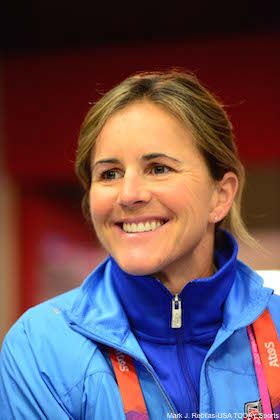Brandi Chastain's sports bra will live on in global soccer lore forever. Now, her head will too.
In an interview with USA Today's Christine Brennan, Chastain revealed Thursday she will donate her brain to the Concussion Legacy Foundation after death.
"I'm not going to be needing it at the end of my life, No. 1," Chastain, 47, said. "Hopefully, what can be learned is, can doctors and scientists and neuroscientists look at the brain of someone like me, who has been playing soccer a majority of my life, and really dissect the brain and say, 'Here's where we see it beginning?' Could we then use that information to help say that before the age of 14, it's not a good idea to head the ball?"
Chastain suffered two concussions during a collegiate career at California and Santa Clara. In the ensuing two decades, she claims to have never shied away from headers, although she "saw stars" and "did what we all used to do and shook it off." Chastain never had an official concussion diagnosis during her career, does not currently suffer from concussion systems and shows no signs of degenerative brain disease.
"As you grow older, you sometimes say, gosh, am I losing my memory or did I used to forget when I went into a room what I went in there for?" Chastain says. "Could this be the start of something?"
More than simply an athlete donating a brain for concussion research, Chastain's donation brings added value coming from a female. Her brain will be studied within the Boston University CTE program, but to this point, only seven of the 307 brains donated to the BU School of Medicine and the Department of Veterans Affairs collaborative brain bank have been women's brains. None have been diagnosed with CTE.
"A question I have is, do men's and women's brains look and respond differently?" Chastain says. "I'm a recovering two-time ACL reconstruction athlete. Why are ACL injuries more common in girls and women than boys and men? Could that also be true with concussions? And if true, what can we do differently?"
Along with USA Today, Chastain spoke to The New York Times Thursday. She applauds the 1999 U.S. National Team for winning a World Cup on home soil, but she believes there may be even more power in her brain.
"This would be a more substantial legacy -- something that could protect and save some kids, and to enhance and lift up soccer in a way that it hasn’t before," Chastain says. "That was the impetus for saying yes. If we can learn something, we should. And I won’t need it."
Among those women who have also promised their brains to BU are Olympic swimmer Jenny Thompson and Chastain's USWNT teammate, Cindy Parlow Cone.
Parlow Cone, who retired in 2006 and continues to suffer from the effects of concussions, and Chastain are two of the leading voices supporting a ban on headers for players under 14:






